Epoxy finish for concrete countertops has become a popular choice among homeowners and designers looking to achieve a sleek, durable, and modern aesthetic. Epoxy is a type of polymer that, when applied to concrete surfaces, forms a hard, glossy finish that enhances both the appearance and functionality of countertops. One of the primary reasons for choosing an epoxy finish is its ability to create a seamless, glass-like surface that is not only visually striking but also incredibly smooth to the touch. This smooth finish makes cleaning and maintenance straightforward, as there are no crevices or grout lines where dirt and grime can accumulate.
In addition to its aesthetic appeal, an epoxy finish provides a highly durable surface that can withstand the rigors of daily kitchen use. Epoxy is known for its excellent resistance to scratches, stains, and impact, making it an ideal choice for countertops that are subjected to heavy use. Whether you are cutting vegetables, placing hot pots, or spilling liquids, an epoxy-coated concrete countertop can handle it all without showing signs of wear and tear. This durability ensures that your countertops will remain looking pristine for many years, providing long-term value for your investment.
The application process of epoxy to concrete countertops involves several steps to ensure a perfect finish. First, the concrete surface must be thoroughly cleaned and prepped to remove any dust, grease, or debris. Any existing imperfections, such as cracks or chips, are repaired using a concrete filler. Once the surface is smooth and clean, a primer is applied to enhance the adhesion of the epoxy. The epoxy is then mixed according to the manufacturer’s instructions and poured onto the countertop. It is spread evenly using a squeegee or roller, ensuring a uniform coating. Finally, the epoxy is left to cure, typically for 24 to 48 hours, resulting in a hard, glossy finish.
One of the significant benefits of an epoxy finish is its ability to be customized. Epoxy can be tinted with various pigments to achieve virtually any color, allowing homeowners to match their countertops with their kitchen decor. Additionally, metallic pigments can be added to create unique, marbled effects that mimic the look of natural stone. This level of customization makes epoxy a versatile option for those looking to create a personalized, one-of-a-kind countertop. Whether you prefer a classic white finish, a bold color, or a marble-like appearance, epoxy can be tailored to meet your design preferences.

Another advantage of epoxy finishes for concrete countertops is their resistance to moisture and chemicals. The non-porous nature of epoxy means that it does not absorb liquids, making it highly resistant to stains from common kitchen substances like wine, coffee, or oil. This resistance to moisture also prevents the growth of mold and bacteria, contributing to a more hygienic kitchen environment. Additionally, epoxy is resistant to many household chemicals, including acidic and alkaline substances, which can damage other types of countertop surfaces.
The seamless nature of epoxy finishes also eliminates the need for grout lines, which can be a common source of maintenance issues in other types of countertops. Grout lines are prone to cracking, staining, and harboring bacteria, all of which require regular maintenance and cleaning. With an epoxy finish, the smooth, continuous surface is much easier to keep clean and sanitary. This makes epoxy-coated concrete countertops an excellent choice for busy households where ease of maintenance is a priority.
Epoxy finishes are also highly UV-resistant, which means they will not yellow or discolor when exposed to sunlight. This is particularly important for countertops that are located near windows or in areas with significant natural light. The UV resistance of epoxy ensures that your countertops will maintain their original color and gloss over time, preserving their aesthetic appeal. This resistance to fading and discoloration adds to the longevity and overall value of epoxy-coated concrete countertops.

In terms of installation, while epoxy application can be a DIY project, it is often recommended to hire professionals to achieve the best results. The process requires precision and expertise to ensure a smooth, bubble-free finish. Professionals have the necessary tools and experience to handle the mixing, pouring, and curing processes effectively. This not only guarantees a high-quality finish but also reduces the risk of mistakes that can be costly to fix. For those who prefer to take on the project themselves, many epoxy kits are available that include detailed instructions and all the necessary materials.
One of the unique aspects of epoxy finishes is their ability to be repaired and resurfaced if they become damaged. Unlike other countertop materials that may require complete replacement if damaged, epoxy can be sanded down and a new layer applied to restore its original appearance. This ability to repair and renew the surface adds to the longevity and cost-effectiveness of epoxy-coated concrete countertops. Homeowners can enjoy a beautiful, durable surface without the need for frequent replacements.
Epoxy finishes also offer excellent thermal resistance, which is essential in a kitchen environment. While it is always advisable to use trivets or hot pads, epoxy can withstand brief contact with hot pots and pans without being damaged. This thermal resistance makes epoxy-coated concrete countertops a practical choice for those who do a lot of cooking and need a surface that can handle high temperatures. However, prolonged exposure to extreme heat should still be avoided to maintain the integrity of the finish.
The versatility of epoxy finishes extends beyond their use in kitchens. They are also popular in bathrooms, laundry rooms, and other areas where a durable, attractive surface is desired. Epoxy-coated concrete countertops can enhance the look and functionality of any space, making them a versatile option for various applications. This adaptability allows homeowners to create a cohesive design throughout their home, using a material they trust for its performance and beauty.
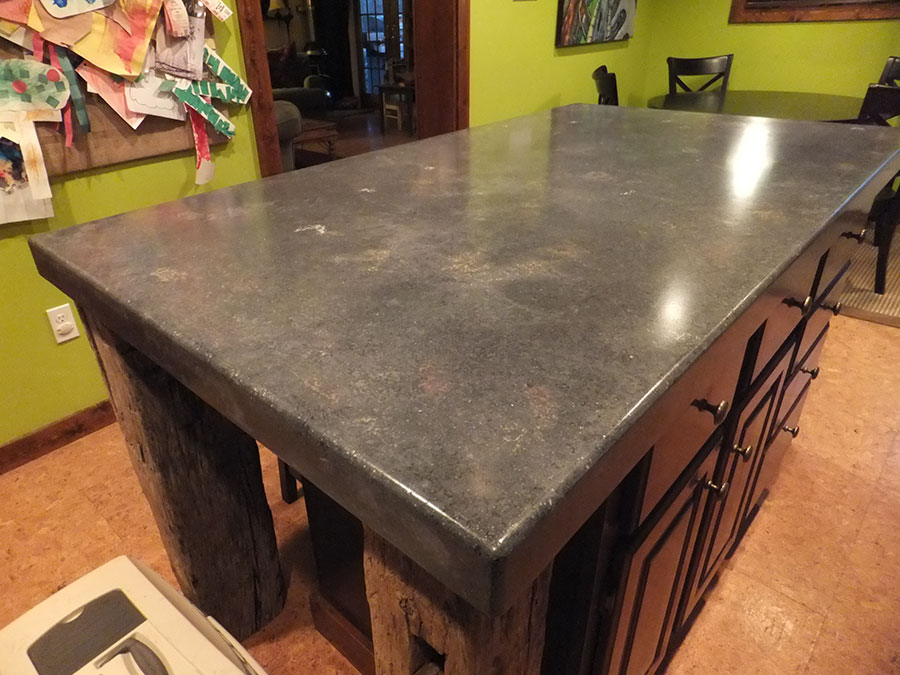
The environmental impact of epoxy finishes is another consideration for homeowners. While epoxy is a synthetic material, many manufacturers are now offering low-VOC (volatile organic compounds) and eco-friendly formulations. These products reduce the emission of harmful chemicals during application and curing, making them a safer choice for indoor use. Additionally, the long lifespan and durability of epoxy-coated countertops mean fewer replacements and less waste over time, contributing to a more sustainable home environment.
In terms of cost, epoxy finishes for concrete countertops are generally more affordable than natural stone options like granite or marble. The cost varies depending on the size of the countertop, the complexity of the design, and whether you choose to hire professionals or do it yourself. While epoxy may require a higher initial investment compared to some other materials, its durability, ease of maintenance, and aesthetic appeal make it a cost-effective option in the long run. Homeowners can achieve a high-end look without breaking the bank.
Finally, the aesthetic versatility and practical benefits of epoxy finishes make them an excellent choice for modern kitchen designs. The ability to create a seamless, glossy surface that mimics the look of more expensive materials while offering superior durability and ease of maintenance is a significant advantage. Epoxy-coated concrete countertops can transform a kitchen, adding both beauty and functionality. Whether you are renovating an existing kitchen or designing a new one, an epoxy finish is a worthwhile consideration that offers long-term value and satisfaction.

Common Mistakes to Avoid
When applying an epoxy finish to concrete countertops, several common mistakes can compromise the final result. One major mistake is inadequate surface preparation. The concrete surface must be thoroughly cleaned, repaired, and primed before applying the epoxy. Any dust, grease, or imperfections can prevent proper adhesion and lead to a subpar finish. Another mistake is not mixing the epoxy components correctly. Precise measurements and thorough mixing are crucial to achieving a consistent and durable finish. Failing to follow the manufacturer’s instructions can result in a finish that is prone to bubbling, peeling, or uneven curing.
Applying the epoxy in an environment with inappropriate temperature and humidity levels is another common error. Epoxy requires specific conditions to cure properly; too cold, too hot, or too humid environments can affect the curing process, leading to defects in the finish. It’s also important to apply the epoxy evenly and avoid overworking it. Using the wrong tools or techniques can create air bubbles, streaks, or an uneven surface. Additionally, neglecting to allow sufficient curing time before using the countertop can result in a finish that is not fully hardened and prone to damage.
Another common mistake is overlooking safety precautions. Epoxy contains chemicals that can be harmful if inhaled or if they come into contact with the skin. Proper ventilation, protective gloves, and masks are essential to ensure safe application. Finally, not considering the long-term maintenance of epoxy finishes can be a mistake. While epoxy is durable, it still requires care to prevent scratches and maintain its gloss. Using cutting boards and avoiding abrasive cleaners are essential practices to keep the countertop in pristine condition.
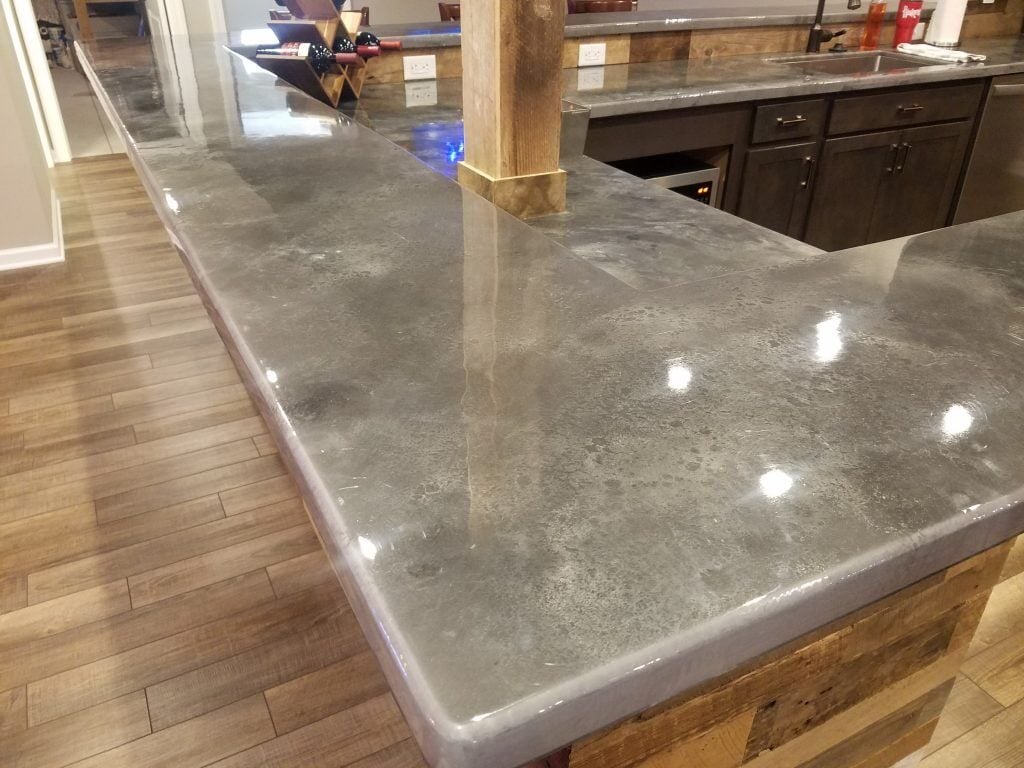
What are the benefits of using epoxy for concrete countertops?
Epoxy offers several benefits for concrete countertops, including a seamless, glossy finish that enhances the appearance and functionality of the surface. It provides excellent durability, resisting scratches, stains, and impact, making it ideal for high-use areas like kitchens. Epoxy is also highly customizable, allowing for a wide range of colors and finishes, including marbled effects that mimic natural stone. Its non-porous nature means it resists moisture and bacteria, contributing to a more hygienic kitchen environment. Additionally, epoxy finishes are UV-resistant, ensuring the countertop maintains its color and gloss over time.
How do I maintain and clean epoxy-coated concrete countertops?
Maintaining and cleaning epoxy-coated concrete countertops is straightforward. For daily cleaning, use a mild soap or a gentle household cleaner with warm water and a soft cloth or sponge. Avoid using abrasive cleaners or pads, as they can scratch the surface. Spills should be wiped up promptly to prevent staining, although the non-porous nature of epoxy makes it resistant to most stains. To maintain the glossy finish, it’s advisable to use cutting boards for food preparation and trivets for hot pots and pans. Regularly check for any signs of wear and consider light buffing or polishing to restore the shine if necessary.
Can I apply an epoxy finish to my countertops myself?
While it is possible to apply an epoxy finish to countertops as a DIY project, it requires careful preparation, precision, and attention to detail. The concrete surface must be thoroughly cleaned, repaired, and primed. Mixing the epoxy components correctly and applying them evenly is crucial to avoid bubbles and achieve a smooth finish. It’s essential to follow the manufacturer’s instructions closely and work in a controlled environment with appropriate temperature and humidity levels. For the best results, and to avoid costly mistakes, many homeowners prefer to hire professionals who have the experience and tools to ensure a flawless finish.
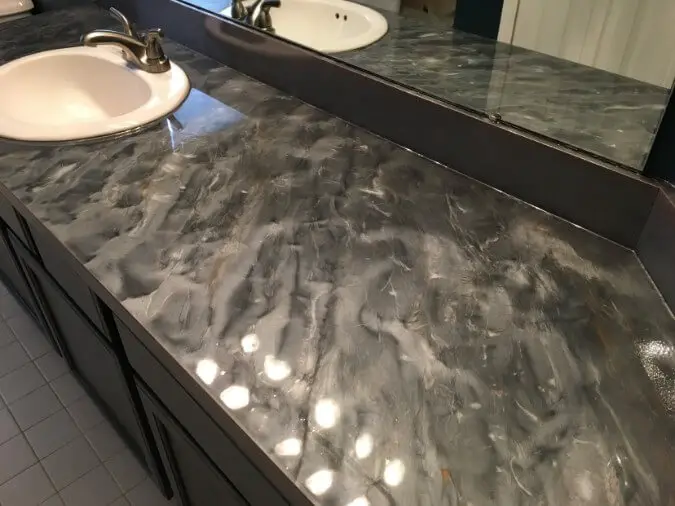
How durable is an epoxy finish for concrete countertops?
An epoxy finish is highly durable and can withstand the demands of daily kitchen use. It is resistant to scratches, stains, and impact, making it an excellent choice for busy households. The non-porous surface prevents moisture and bacteria from penetrating, contributing to a hygienic environment. Epoxy also offers good thermal resistance, although it is advisable to use trivets for hot pots and pans to prevent any potential damage. With proper care and maintenance, epoxy-coated concrete countertops can last for many years, retaining their appearance and functionality.
Are epoxy finishes environmentally friendly?
While epoxy is a synthetic material, many manufacturers now offer low-VOC and eco-friendly formulations that reduce the emission of harmful chemicals during application and curing. These products are safer for indoor use and have a lower environmental impact. Additionally, the long lifespan and durability of epoxy-coated countertops mean fewer replacements and less waste over time, contributing to sustainability. Choosing eco-friendly epoxy products and following proper application procedures can help minimize the environmental footprint of using epoxy finishes in your home.
What should I do if my epoxy-coated countertop gets damaged?
If your epoxy-coated countertop gets damaged, it can often be repaired without needing to replace the entire surface. Minor scratches and imperfections can be sanded down, and a new layer of epoxy can be applied to restore the finish. For more significant damage, such as deep scratches or chips, it may be necessary to sand down the affected area and apply a patch of epoxy. In some cases, it might be best to hire a professional to ensure a seamless repair. Regular maintenance and careful use can help prevent damage and extend the life of your epoxy-coated countertops.

Scratch and UV Resistant Epoxy for New or Resurfacing Countertops
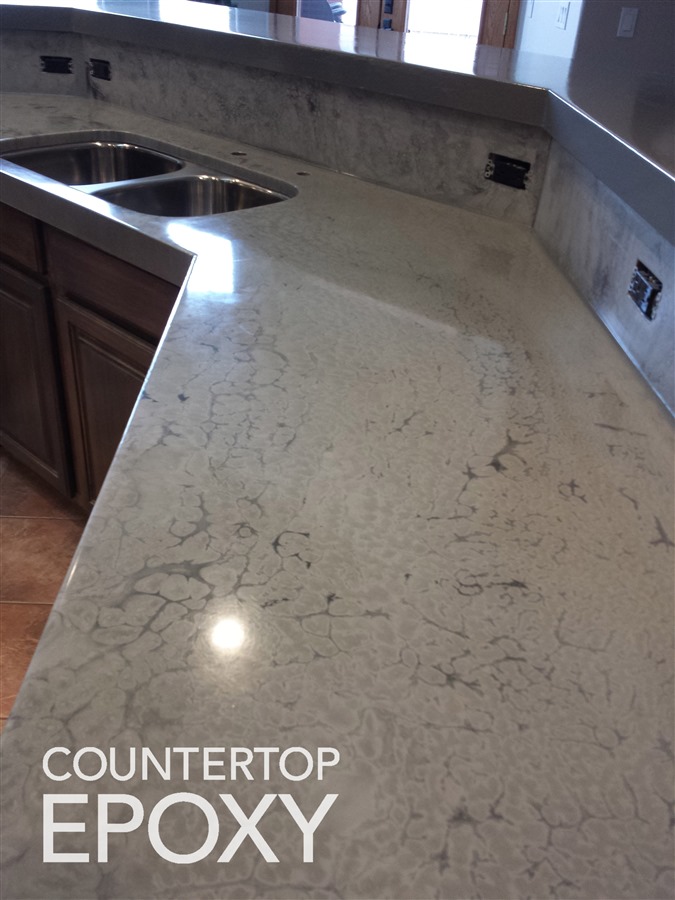
Advantages & Disadvantages of Epoxy Countertops
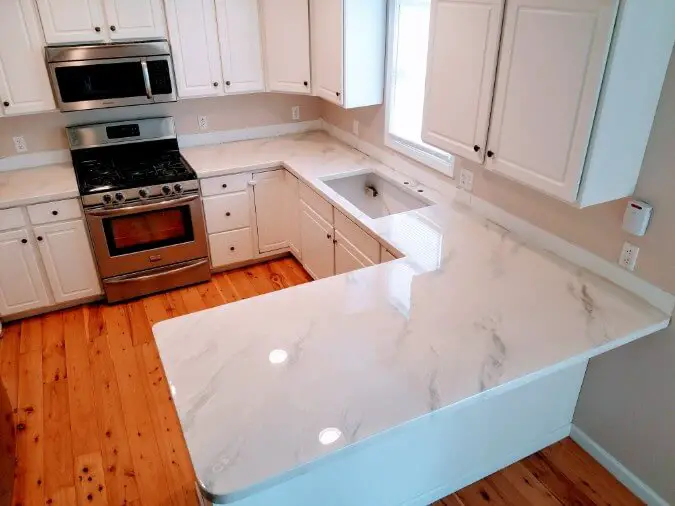
Concrete Countertop Epoxy Coating

Related articles:
- Concrete Countertop Overlay
- Black Concrete Countertops
- Marble Look Concrete Countertops
- Light Grey Concrete Countertops
- Concrete Countertop Design Ideas
- Light Colored Concrete Countertops
- Epoxy On Concrete Countertop
- Concrete Countertops Designs
- Concrete Countertops That Look Like Wood
- White Concrete Countertops